Feds say Liberty University created 'fear of reprisal' for sexual violence survivors
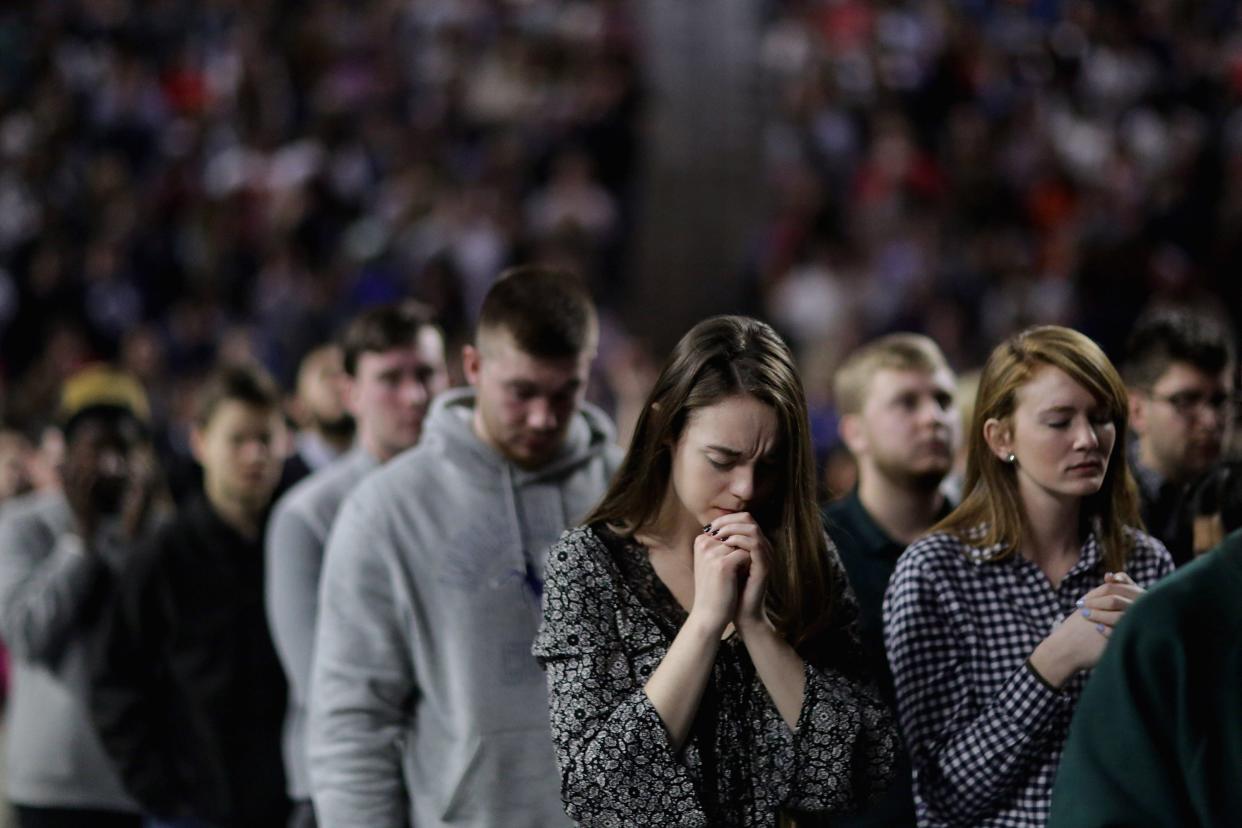
- Oops!Something went wrong.Please try again later.
UPDATE: This story has been updated with comments from Jerry Falwell Jr.
Liberty University, one of the most prominent Christian colleges in the country, created a culture in which members of its campus community were fearful of reporting sexual violence, according to a preliminary report from the Department of Education obtained by USA TODAY.
“Victims of sexual assault felt dissuaded by Liberty administration’s reputation for punishing sexual assault survivors rather than helping them,” federal investigators wrote in the May report
Liberty has faced increasing public pressure in recent years over policies that survivors say allow sexual violence to run unchecked. The preliminary report says overlooked allegations of violence reached all the way to the top, including accusations involving a former university president and a senior administrator.
Survivors filed a lawsuit in 2021 against Liberty, saying it had ignored their reports while enforcing a code of conduct known as the Liberty Way. A dozen women settled with the the Lynchburg, Virginia, university the following year in an agreement that remains private.
The Education Department’s investigation had been reported before. It centers on whether the university compiled with the Clery Act, a federal law that requires universities to report crime that occurs on their campus. However, the May report contains new details about the university’s attempts to cover its tracks.
Education Department investigators, for example, discovered that “senior officials in HR sought the assistance of IT staff to wipe certain computer hard drives on April 26, 2022, the very week that the review team first visited the campus.”
That finding is based on interviews with a former dean at Liberty and IT staffer, and it occurred hours after investigators spoke to the university’s executive vice president of human resources about “the importance of maintaining records.”
“It does not appear that any institution-wide record retention program has ever existed at Liberty with respect to its campus security operations, although some individual officers did establish their own guidelines for their operations,” the report read. “Similarly, the university has been unable to provide the basic documentation to substantiate the accuracy and completeness of the university’s campus crime statistics.”
Investigators also referenced a 2016 incident in which a Liberty Police officer noted “stacks of incident reports laying on tables in an unsecured room.” That person later learned the records were to be “shredded.” The officer reported the incident to the “LUPD headquarters,” but a supervisor eventually told the officer to “return to service.” It’s unclear whether the documents were shredded.
For its part, Liberty University said in a statement that it has improved its process for complying with the federal government’s requirements. The institution also said it had responded to the government’s initial report by “detailing significant errors, misstatements, and unsupported conclusions in the Department’s preliminary findings,” the statement read.
“Liberty University remains fully committed to ensuring compliance in this area is met and maintained and understands the purpose of this review process is ultimately in the greater interest of our students, faculty, and staff,” said Liberty President Dondi Costin. “More than that, we recognize the original purpose of the Clery Act is for the health, safety, and overall well-being of our entire University community as we remain steadfast in our mission of Training Champions for Christ.”
The Education Department didn’t return USA TODAY's request for comment Tuesday but responded on Wednesday, saying the agency doesn't discuss ongoing investigations. Federal law requires the department to keep reports confidential until the government shares the investigation’s outcome with the school. The preliminary report – also reported by The Washington Post – is expected to be followed by final findings, which could include such repercussions for the university as fines and monitoring by the federal government.
In the report, however, investigators noted: “Multiple victims reported to the review team that they felt that the reporting process at Liberty further complicated an already difficult time in their lives and that they would have been better off if they had not reported these crimes in the first place.”
USA TODAY spoke to two of the former students who say they were assaulted while students at Liberty University. Sarah Mays and Helen Wood said they were part of the lawsuit but did not settle with the university. They said it was important for them to be able to speak freely about their experience – which typically is not allowed under terms of a settlement – with the hope of improving Liberty in the long term.
The federal government can issue fines as part of Clery Act investigations, but both survivors questioned how much impact any fine would have on the monied university. Liberty’s endowment was roughly $1.6 billion in fiscal year 2020 and among the largest in the country, according to government data.
“A little fine is not going to make them change their ways,” said Mays, who says she was intimidated into retracting her report of being attacked and raped by multiple men in 2001. “They can make back any amount of money with a snap of fingers.”
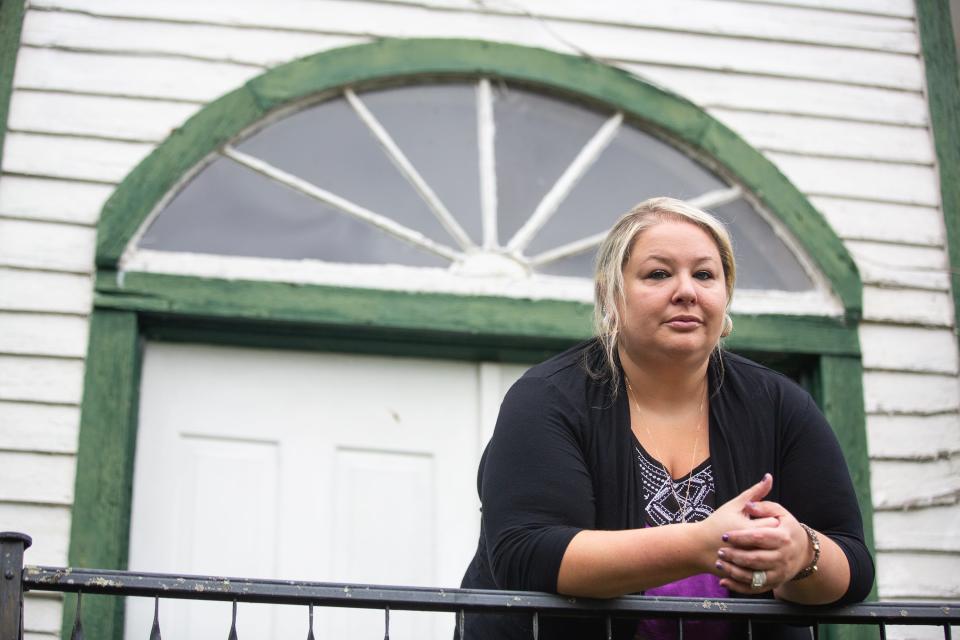
Liberty is one of the nation’s most prominent Christian universities and a mainstay among Republican luminaries. Jerry Falwell, a prominent televangelist and conservative figure, started the school in 1971. Based in Virginia, the university owes its recent growth to online students – a combined student body of about 93,000 – and it received about $857 million in federal money for student aid, making it one of the largest recipients of such funding
The institution’s image as a Christian sanctuary has been challenged in recent years, often by its own leadership. Jerry Falwell Jr., who took over after his father’s death in 2007 and helped shape it into the massive institution it is today, resigned in 2020 after a sex scandal involving him, his wife and another man.
What did the Department of Education investigation find?
In the May report, the Education Department listed 12 findings, which include a lack of administrative capability, inaccurate or inadequate policy disclosures, and a failure to issue timely warnings in connection with the Clery Act.
Investigators noted, for instance, that police took a report involving an “alleged rape that was committed by a former Liberty president,” but that incident failed to make a daily crime log. The report did not name the president or what came of the investigation. The Post reported that only two presidents were alive when the report was produced: the junior Falwell and John Borek, a member of the board.
Borek did not return requests for comment. But Falwell told USA TODAY that he had never heard of a rape allegation involving a Liberty president while he was at the institution. He said had spoken to Education Department investigators a few months back, but they did not ask him about the rape allegation involving a former president.
Falwell added that he recently learned that Liberty’s general counsel and other administrators, “saw it as their job to keep me from being aware of any reported crimes or accusations of assault.” They reasoned, he said, that he might try to intervene on the behalf of a top student athlete or someone from a prominent family.
Investigators also found a longtime staffer had been accused repeatedly of harassing Liberty employees, but the campus was never warned about him. In one instance, he allegedly arrived at an employee's home and gave her “medicine” that caused her to fall asleep. When she awoke, that employee was kissing her. Investigators wrote that the employee was eventually demoted for his actions. A year later, though, the employee got a promotion.
Liberty regularly touted itself as the “safest college in Virginia,” the report says, and “issuing emergency notifications would have conflicted with that narrative and called attention to the safety issues that existed on Liberty’s campus.”
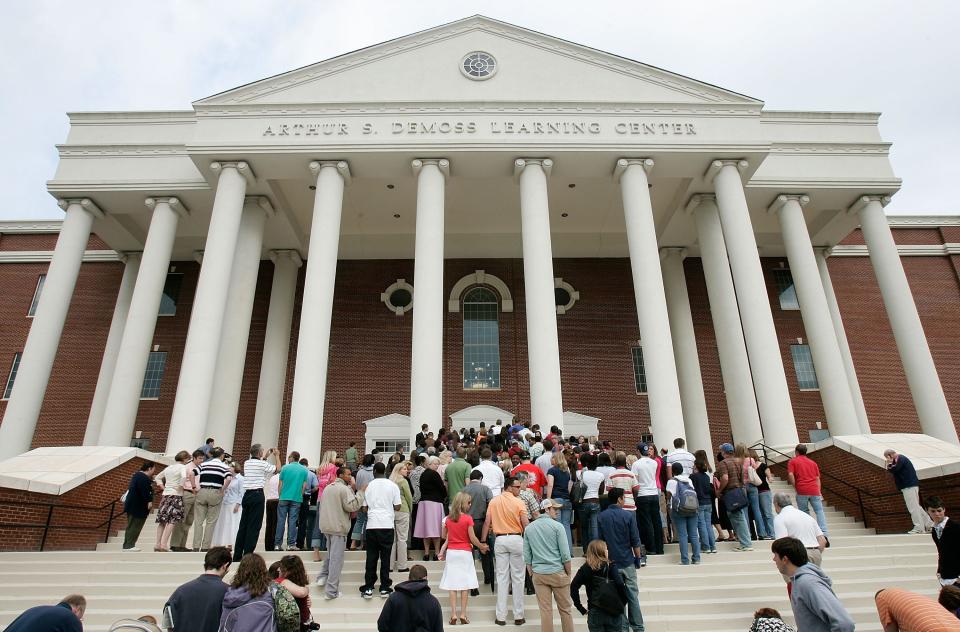
Investigators mentioned a student who played for the football team from 2018 to 2022 and was accused of rape in 2020. That player, investigators wrote, went on to stalk a woman who was a student and university employee repeatedly in 2021 and 2022.
“Despite the football player’s history of sexual violence, there is no evidence that University officials ever considered alerting the campus about the threat to the Liberty campus community,” the report said.
The department also found Liberty failed to report dozens of criminal offenses from 2016 to 2020 that included incidents of rape, domestic violence and stalking. The federal government added that victims of sexual assault often feared speaking up because of “fear of reprisal.”
Liberty didn’t have the resources to investigate crimes on its campus, according to federal investigators. They noted that the university’s investigative unit was “staffed by a single officer for the majority of the review period with few process controls and minimal oversight.”
What is the Liberty Way?
Most universities have policies meant to serve as rough guidelines for how students should behave on campus. These codes of conduct vary but often include prohibitions on hazing, underage drinking and harassment.
Some religious institutions build tenets of their faith into their codes of conduct. Brigham Young University requires that students remain “chaste” outside marriage and abstain from alcohol, tobacco and coffee. And it’s Liberty’s code, known as the Liberty Way, that survivors say fostered an environment in which sexual violence ran unchecked and underreported.
In 2021, ProPublica documented how women who had been raped faced potential violations of the school’s code of conduct when they reported what happened to them. Some were told they would get into trouble because they had been drinking. Others recalled how university staffers discouraged students from reporting when they were assaulted. The assault, college administrators argued, proved they had had sex before marriage, which was against Liberty’s honor code. Several said college staffers altered or removed evidence tied to their reports.
Mays and Wood say they experienced the Liberty Way firsthand. Mays, a student who was Jane Doe 15 in the lawsuit, said she was attacked and raped by multiple men in October 2001 while walking near the campus late at night. Months later, she found out she was pregnant.
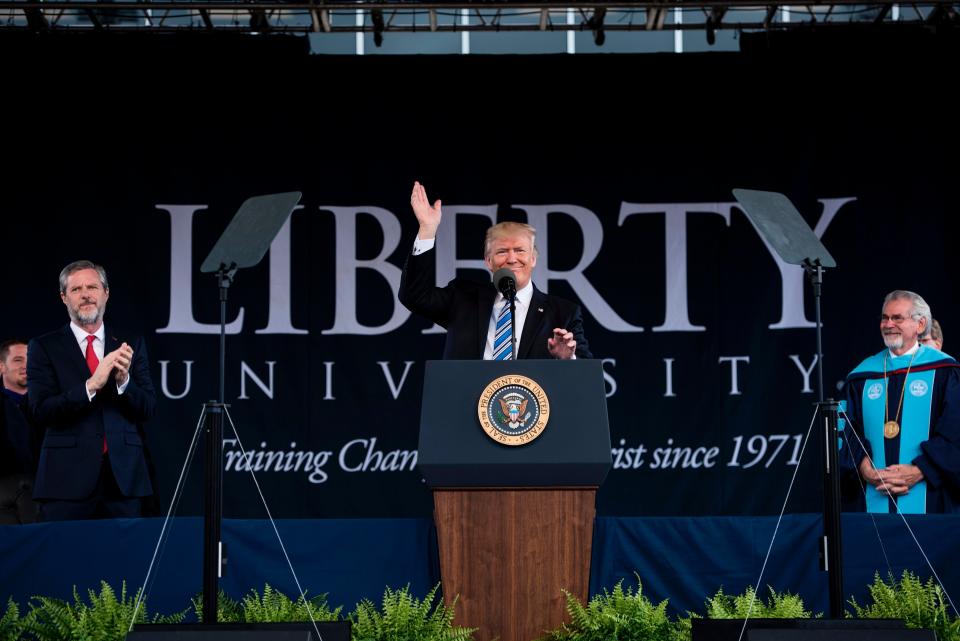
She didn’t immediately report what happened, Mays said, but then one of her attackers stalked her on campus with a knife. At the Liberty Police Department, officers pressured her to file a report about the more recent incident but to leave out that her attacker had a knife. She was then directed to file a report with the Lynchburg Police Department, where she said officers again intimidated her into altering her report.
Eventually, Mays withdrew her case altogether.
As a result, she said the dean of Liberty’s office of women accused her of filing a fraudulent police report. Additionally, because Mays was unmarried and pregnant, she could face expulsion and the loss of her scholarship for violating the Liberty Way.
The dean, Mays said, offered her space in a program meant for unwed women who were pregnant. That offer came with a four-year scholarship if Mays put her child up for adoption. She declined. Her daughter just celebrated her 21st birthday.
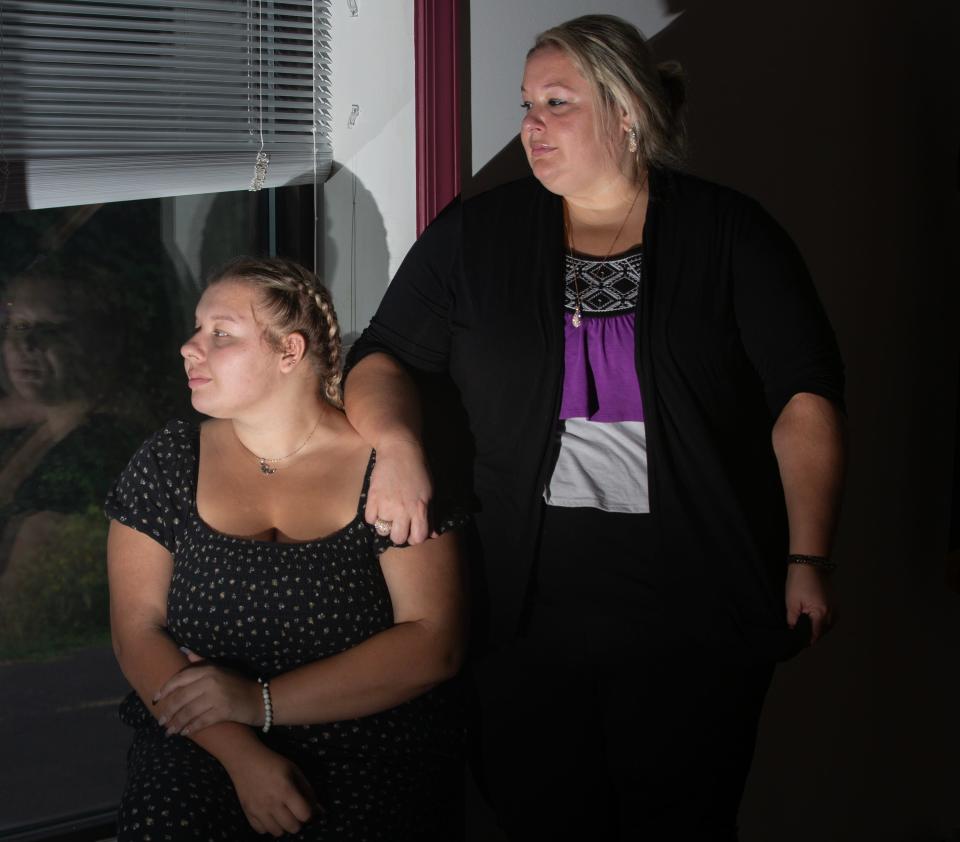
Wood said she was raped by a member of her taekwondo team in 2015, but Liberty made it difficult to report the case. She said the university also directed her to the Lynchburg Police Department. If she refused, Wood said she was told the university would use the information she shared with them against her – like the fact that she had been drinking before the attack.
She decided not to say anything at all.
The attack disrupted her studies. Rather than continue on campus, Wood opted to take classes online before pausing her education. She is still trying to complete her degree.
For Wood, there had been little question she would attend Liberty in the first place. Few campuses offered a higher education in the type of religious and cultural environment she wanted. She said she was led to believe it was the type of place where sexual assault didn’t happen. Yet Wood said she would have attended even if she had known the truth.
“It’s not going to hurt the reputation of the school if they were just honest,” she said.
What is the Clery Act?
All universities and schools that receive federal funding are required to publish annual reports of the crimes that occur on their campuses. The law that requires that reporting is known as the Clery Act, named after 19-year-old Jeanne Clery, who was raped and murdered on Lehigh University’s campus in 1985.
The Education Department’s investigation focused on whether Liberty complied with the Clery Act. It was not a review of the university’s compliance with Title IX, the federal law meant to prevent sex-based discrimination within schools, which is the more common law used in such cases.

That difference might seem minor, but USA TODAY has found that schools determined to be in violation of Title IX seldom face sanctions even though the government can technically withhold federal funding.
The Education Department has occasionally fined schools that failed to meet provisions of the Clery Act, including a $2.4 million fine to Pennsylvania State University in connection with Jerry Sandusky, a former assistant football coach convicted of molesting multiple children.
The largest to date is the $4.5 million penalty Michigan State faced in connection with its handling of sports doctor Larry Nassar and the women he victimized.
Mays and Wood remain hopeful the university will change, saying they continue to hold what the institution has been and could be in high regard. Both kept taking classes at Liberty after their attacks, and Mays earned a bachelor’s and a master’s degree.
Although they said the fine is a good first step, they want to see the Education Department open a Title IX investigation into the university as well.
Chris Quintana is an investigative reporter at USA TODAY. He can be reached at cquintana@usatoday.com or via Signal at 202-308-9021.He is on X at @CQuintanaDC.
This article originally appeared on USA TODAY: Liberty University dissuaded students from reporting sexual violence

